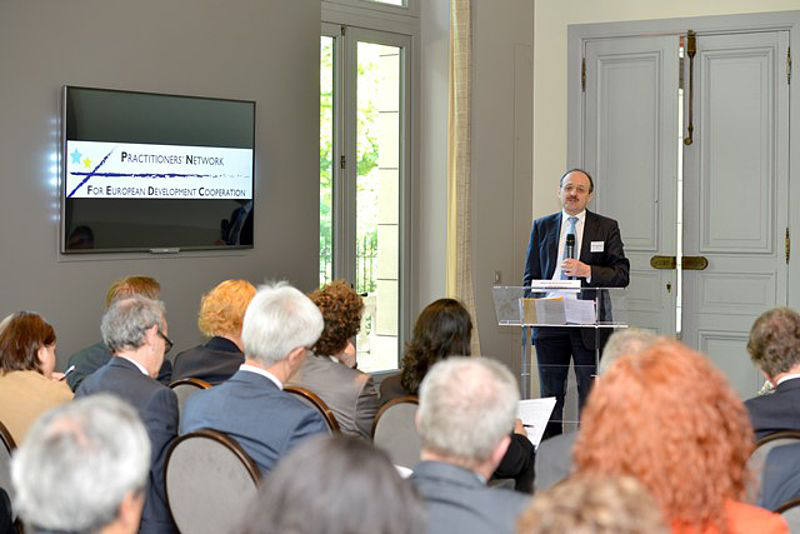-
09 February 2017
Category : Interview
FIIAPP and its work in the Practitioners´ Network
We talk to Cecilia Castillo, the FIIAPP representative in Brussels, about our work in networks with other cooperation agencies.

In our post this week, we talk to the FIIAPP representative in Brussels, Cecilia Castillo, about our role in the Practitioners´ Network, a network of European Union cooperation agencies formed in 2007 to promote collaboration and knowledge exchange between the various agencies and the European Commission within the scope of European cooperation policy.
In addition to the European Commission, the network is made up of another 14 organisations from 12 Member States of the European Union.
FIIAPP joined the network in 2014 and took a very active role. Previously it was an observer and participated in the discussions of the network, but without voting rights.
Our objective in being in the network is to contribute to the coherence and complementarity of the actions of the different European cooperation actors to improve our efficiency and effectiveness in programme management. This involves sharing the challenges that the agencies are facing at the project implementation level in order to find solutions jointly.
What advantages does participation in this network have for FIIAPP?
The first-hand access to trends and the major discussions about European development cooperation. This is facilitated by the fact that the European Commission itself is one of the members of the network. And also the exchange of experiences with all the other agencies is very important to FIIAPP in a context as volatile as that of cooperation.
For example, the agencies in the network jointly negotiated a contract model applicable to projects funded by the European Union. The large agencies have large well-staffed departments that take care of these matters and make their analyses and conclusions available to the rest of the members. Based on this, there is discussion and adoption of a common position with respect to the European Commission. Many of the agencies would be unable to even begin to assess these changes, and thanks to the network they not only can analyse and comprehend them but also defend their position and have greater strength because they are going in with another 13 agencies.
One of the main advantages of participating in this network is the chance to participate in and influence the key discussions about items on the cooperation agenda, such as reform of the European Consensus on Development (policy framework) and reform of the Financial Regulation (legal framework applicable to all programmes and projects that receive European funds). It has also allowed us to participate in improving how the Fiduciary Funds function.
What is FIIAPP’s contribution to the Practitioners´ Network?
We contribute a fresh and different point of view. On one hand, we are specialised in programmes for exchange of experiences between administrations and in the work of public technical cooperation. On the other, the majority of the agencies are national cooperation agencies, with the rigidity that characterises these organisations which are very accustomed to their own practices and procedures. FIIAPP, in contrast, being a foundation, has a flexibility that allows us to be more agile, and this characteristic is very important in the current situation where rapid actions are required.
Could you highlight some activities that the network organises each year?
The most important event of the year, which brings together the most senior representatives of the agencies and of the European Commission, is the General Assembly. It is held over two days. On the first day, prominent figures working in European cooperation talk about the hot topics; in 2016 these were countries in crisis and fragility and modes of cooperation. On the second day, operational matters of the network are addressed, such as the strategic priorities that will give rise to the working groups for the year.
In the framework of the working groups, there is discussion and negotiation with the European Commission; workshops and periodic meetings are organised; position papers and studies are prepared, etc. And this connects with the visibility actions for publicising the work of the network and its added value.
What are the challenges of the network for the future?
The most important challenge the network is facing at the moment is joint implementation. And this challenge arises out of the current European cooperation panorama, in which cooperation programmes are increasingly ambitious and the European Commission has less implementation capacity. In this context, a narrower and more effective cooperation on the part of the various European agencies becomes necessary. Along these lines, the directors of the agencies of the network signed a statement on joint implementation in November. This statement represents a clear intention on the part of the organisations to join forces, take advantage of the best of each one and to complement each other so that the resources and specialisation of each are used effectively and lead to better outcomes in the countries where we work. To do this, we are working now on the framework of one of the working groups, “effective partnerships”, of the network. It’s complicated because of the different nature of the agencies, and it requires considerable effort, but we have high hopes for it.
And, in terms of long-term challenges, the network will try to contribute to the commitments agreed to internationally (sustainable development and development effectiveness goals). And we are also working to increase the participation and influence of European development agencies on the international scene.
The views and opinions expressed in this blog are the sole responsibility of the person who write them.




